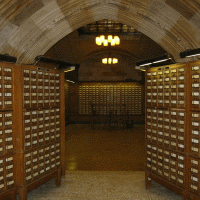Paul
The Room
Mar 24, 2009

In that place between wakefulness and dreams, I found myself in the room. There were no distinguishing features save for the mysterious array of black filing cabinets. They were like the ones in libraries that list titles by author or subject in alphabetical order. But these files, which stretched from floor to ceiling and seemingly endlessly in either direction, had very different headings. As I drew near the wall of files, the first to catch my attention was one that read “Girls I Have Liked.” I opened it and began flipping through the cards. I quickly shut it, shocked to realize that I recognized the names written on each one.
And then without being told, I knew exactly where I was. This lifeless room with its small files was a crude catalog system for my life. Here were written the actions of my every moment, big and small, in a detail my memory couldn't match.
A sense of wonder and curiosity, coupled with horror, stirred within me as I began randomly opening files and exploring their content. Some brought joy and sweet memories; others a sense of shame and regret so intense that I would look over my shoulder to see if anyone was watching. A file named “Friends” was next to one marked “Friends I Have Betrayed.”
The titles ranged from the mundane to the outright weird. “Books I Have Read,” “Lies I Have Told,” “Comfort I Have Given,” “Jokes I Have Laughed At.” Some were almost hilarious in their exactness: “Things I’ve Yelled at My Brothers.” Others I couldn't laugh at: “Things I Have Done in My Anger,” “Things I Have Muttered Under My Breath at My Parents.” I never ceased to be surprised by the contents. Often there were many more cards than I expected. Sometimes fewer than I hoped.
I was overwhelmed by the sheer volume of the life I had lived. Could it be possible that I had the time in my 20 years to write each of these thousands or even millions of cards? But each card confirmed this truth. Each was written in my own handwriting. Each signed with my signature.
When I pulled out the file marked “Songs I Have Listened To,” I realized the files grew to contain their contents. The cards were packed tightly, and yet after two or three yards, I hadn’t found the end of the file. I shut it, shamed, not so much by the quality of music, but more by the vast amount of time I knew that file represented.
When I came to a file marked “Lust,” I felt a chill run through my body. I pulled the file out only an inch, not willing to test its size, and drew out a card. I shuddered at its detailed content. I felt sick to think that such a moment had been recorded.
An almost animal rage broke on me. One thought dominated my mind: “No one must ever see these cards! No one must ever see this room! I have to destroy them!” In an insane frenzy I yanked the file out. Its size didn’t matter now. I had to empty it and burn the cards. But as I took it at one end and began pounding it on the floor, I could not dislodge a single card. I became desperate and pulled out a card, only to find it as strong as steel when I tried to tear it
Defeated and utterly helpless, I returned the file to its slot. Leaning my forehead against the wall, I let out a long, self-pitying sigh. And then I saw it. The title bore “People I Have Shared the Gospel With.” The handle was brighter than those around it, newer, almost unused. I pulled on its handle and a small box not more than three inches long fell into my hands. I could count the cards it contained on one hand.
And then the tears came. I began to weep. Sobs so deep that they hurt started in my stomach and shook through me. I fell on my knees and cried. I cried out of shame, from the overwhelming shame of it all. The rows of file shelves swirled in my tear-filled eyes. No one must ever, ever know of this room. I must lock it up and hide the key.
But then as I pushed away
Share
Post comment
Like
The Perfect Mistake - Story
May 29, 2008

My mother's father worked as a carpenter. On this particular day, he was building some crates for the clothes his church was sending to orphanages in China. On his way home, he reached into his shirt pocket to find his glasses, but they were gone. When he mentally replayed his earlier actions, he realized what had happened. The glasses had slipped out of his pocket unnoticed and fallen into one of the crates, which he had nailed shut. His brand new glasses were heading for China!
The Great Depression was at its height and Grandpa had six children. He had spent $20 for those glasses that very morning. He was really upset by the thought of having to buy another pair. "It's not fair," he told God as he drove home in frustration. "I've been very faithful in giving of my time and money to your work, and now this."
Months later, the director of the orphanage was on furlough in the United States. He wanted to visit all the churches that supported him in China, so he came to speak one Sunday at my grandfather's small church in Chicago.
The missionary began by thanking the people for their faithfulness in supporting the orphanage. "But most of all," he said, "I must thank you for the glasses you sent last year. You see, the Communists had just swept through the orphanage, destroying everything, including my glasses. I was desperate. Even if I had the money, there was simply no way of replacing those glasses. Along with not being able to see well, I experienced headaches every day, so my co-workers and I were much in prayer about this. Then your crates arrived. When my staff removed the covers, they found a pair of glasses wedged between two blankets.
The missionary paused long enough to let his words sink in. Then, still gripped with the wonder of it all, he continued, "Folks, when I tried on the glasses, it was as though they had been custom made just for me! I want to thank you for being a part of that."
The people listened, happy for the miraculous glasses. But the missionary surely must have confused their church with another, they thought. There were no glasses on their list of items to be sent overseas. But sitting quietly in the back, with tears streaming down his face, an ordinary carpenter realized the Master Carpenter had used him in an extraordinary way.
There are times we want to blame God instead of thanking him! Perhaps it is something we ought to try more often, "Thank you, God, for not allowing my car to start this morning." He may have been saving your life from a car accident. "Lord Jesus, thank you for letting me lose my glasses. I'm sure they'll be put to good use or there is a lesson to be learned."
Always look for the perfect mistakes.
--Unknown
Share
Post comment
Like
The Eye of the Beholder
May 4, 2008
Here is a story to think about. How many times do we wonder how we are going to afford that new car or the new home? We think of ourself as poor. It is more how we view our current life and what we have or do not have.
Listen to this story:
There's a story told about an elderly lady in Arkansas. The state voted to increase welfare payments to indigents. Hoping for a tear-jerker story, a television interviewer went into the backhills where many welfare recipients lived.
The old woman he chose to interview lived in a one room shack: draughty in winter; stifling in summer. Her bed was a few rough planks nailed together, with a pine needle mattress. A couple thin blankets, and a fireplace, did little to protect her from the cold.
Her furniture, a table and two chairs, were fashioned from the same rough wood as her bed. Some shelves held a few cans of food from the general store, a three mile walk down the road. Several jars of preserves and a few squash completed her larder.
She had no refrigerator or freezer. The fireplace provided heat for cooking. With no phone or television, her only connection with the outside world was an old radio that pulled in two or three local stations on a good day.
The old woman had one convenience: running water. A crystal clear stream gurgled a short distance behind her home.
A small garden near her back door provided fresh vegetables during the summer, and some squash and turnips for the winter. A tidy flower garden brightened the front of her house.
The television crew arrived and set up their big expensive cameras. Their mobile station broadcast pictures of the woman and the place she called home.
Eventually, the interviewer asked the old woman, "If the government gave you $200 more each month, what would you do with it?"
Without hesitation, the woman replied, "I'd give it to the poor."
--Peggie C. Bohanon
Share
Post comment
Like
But you don't understand
May 4, 2008
Matthew 22:25 Now there were with us seven brethren: and the first, when he had married a wife, deceased, and, having no issue, left his wife unto his brother:
26 Likewise the second also, and the third, unto the seventh.
27 And last of all the woman died also.
28 Therefore in the resurrection whose wife shall she be of the seven? for they all had her.
29 Jesus answered and said unto them, Ye do err, not knowing the scriptures, nor the power of God.
30 For in the resurrection they neither marry, nor are given in marriage, but are as the angels of God in heaven. KJV
I have heard it commented many times, “Why can't God be a women?”. How about the term “Mother God”. It is only an image of things we do not understand. The Pharisees came to Jesus to pose a question based on male and female. To be more specific husband and wife. There was a problem with their thinking. The assumption was that heaven had male and female beings if you will. Many believed that the earthly marriages would extend after the resurrection. Just like the assumption that God could be a male or female, it was wrong. Heaven does not have a gender. A joke I heard is that they are gender neutral.
So often we look through the eyes of men. Our Heavenly Father is a perspective of God based on a male dominated society. It is not wrong but it helps us to understand who God is. Some what to carry it much further to the image of a female God or a God with both male and female aspects. But Jesus says we don't understand. In some versions it says that they are nether male or female in heaven.
One thing I do like it says we will be like angels. That is something to look forward to.
Be Blessed and remember one day we will be like angels.
Share
Post comment
Like